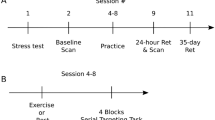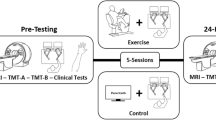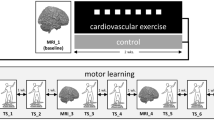Abstract
The acute impact of cardiovascular exercise on implicit motor learning of stroke survivors is still unknown. We investigated the effects of cardiovascular exercise on implicit motor learning of mild-moderately impaired chronic stroke survivors and neurotypical adults. We addressed whether exercise priming effects are time-dependent (e.g., exercise before or after practice) in the encoding (acquisition) and recall (retention) phases. Forty-five stroke survivors and 45 age-matched neurotypical adults were randomized into three sub-groups: BEFORE (exercise, then motor practice), AFTER (motor practice, then exercise), and No-EX (motor practice alone). All sub-groups practiced a serial reaction time task (five repeated and two pseudorandom sequences per day) on three consecutive days, followed 7 days later by a retention test (one repeated sequence). Exercise was performed on a stationary bike, (one 20-min bout per day) at 50% to 70% heart rate reserve. Implicit motor learning was measured as a difference score (repeated—pseudorandom sequence response time) during practice (acquisition) and recall (delayed retention). Separate analyses were performed on the stroke and neurotypical groups using linear mixed-effects models (participant ID was a random effect). There was no exercise-induced benefit on implicit motor learning for any sub-group. However, exercise performed before practice impaired encoding in neurotypical adults and attenuated retention performance of stroke survivors. There is no benefit to implicit motor learning of moderately intense cardiovascular exercise for stroke survivors or age-matched neurotypical adults, regardless of timing. Practice under a high arousal state and exercise-induced fatigue may have attenuated offline learning in stroke survivors.


Similar content being viewed by others
Availability of data and materials
Data are available at the link: https://figshare.com/articles/dataset/Raw_data_-_Implicit_learning_x_exercise_x_stroke/20043695. The motor task code can be verified in the following link: https://github.com/bastosfh/SRT_psychtoolbox.
References
Baird JF, Gaughan ME, Saffer HM et al (2018) The effect of energy-matched exercise intensity on brain-derived neurotrophic factor and motor learning. Neurobiol Learn Mem 156:33–44. https://doi.org/10.1016/j.nlm.2018.10.008
Bates D, Mächler M, Bolker B, Walker S (2015) Fitting linear mixed-effects models using lme4. J Stat Softw. https://doi.org/10.18637/jss.v067.i01
Beck AT, Steer RA, Brown GK (1996) Manual for the Beck depression inventory-II. San Antonio, TX Psychol Corp, pp 1–82
Bermejo J-L, Valldecabres R, Villarrasa-Sapiña I et al (2022) Increased cortisol levels caused by acute resistance physical exercise impair memory and learning ability. PeerJ 10:e13000. https://doi.org/10.7717/peerj.13000
Billinger SA, Arena R, Bernhardt J et al (2014) Physical activity and exercise recommendations for stroke survivors: a statement for healthcare professionals from the American Heart Association/American Stroke Association. Stroke 45:2532–2553. https://doi.org/10.1161/STR.0000000000000022
Bonuzzi GMG, Torriani-Pasin C (2022) Cardiovascular exercise and motor learning in non-disabled individuals: a systematic review with a behavioral emphasis. Mot Rev Educ Física. https://doi.org/10.1590/s1980-65742022005221
Boyd LA, Winstein CJ (2001) Implicit motor-sequence learning in humans following unilateral stroke: the impact of practice and explicit knowledge. Neurosci Lett 298:65–69. https://doi.org/10.1016/S0304-3940(00)01734-1
Boyd LA, Winstein CJ (2003) Impact of explicit information on implicit motor-sequence learning following middle cerebral artery stroke. Phys Ther 83:976–989
Boyd LA, Winstein CJ (2004a) Providing explicit information disrupts implicit motor learning after basal ganglia stroke. Learn Mem 11:388–396. https://doi.org/10.1101/lm.80104
Boyd LA, Winstein CJ (2004b) Cerebellar stroke impairs temporal but not spatial accuracy during implicit motor learning. Neurorehabil Neural Repair 18:134–143. https://doi.org/10.1177/0888439004269072
Boyd LA, Winstein CJ (2006) Explicit information interferes with implicit motor learning of both continuous and discrete movement tasks after stroke. J Neurol Phys Ther 30:46–57
Boyd LA, Quaney BM, Pohl PS, Winstein CJ (2007) Learning implicitly: effects of task and severity after stroke. Neurorehabil Neural Repair 21:444–454. https://doi.org/10.1177/1545968307300438
Boyd LA, Edwards JD, Siengsukon CS et al (2009) Motor sequence chunking is impaired by basal ganglia stroke. Neurobiol Learn Mem 92:35–44. https://doi.org/10.1016/j.nlm.2009.02.009
Boyne P, Dunning K, Carl D et al (2013) High-intensity interval training in stroke rehabilitation. Top Stroke Rehabil 20:317–330. https://doi.org/10.1310/tsr2004-317
Branscheidt M, Kassavetis P, Anaya M et al (2019) Fatigue induces long-lasting detrimental changes in motor-skill learning. Elife. https://doi.org/10.7554/eLife.40578
Charalambous CC, Alcantara CC, French MA et al (2018) A single exercise bout and locomotor learning after stroke: physiological, behavioural, and computational outcomes. J Physiol 596:1999–2016. https://doi.org/10.1113/JP275881
Crozier J, Roig M, Eng JJ et al (2018) High-intensity interval training after stroke: an opportunity to promote functional recovery, cardiovascular health, and neuroplasticity. Neurorehabil Neural Repair 32:543–556. https://doi.org/10.1177/1545968318766663
Dahms C, Brodoehl S, Witte OW, Klingner CM (2020) The importance of different learning stages for motor sequence learning after stroke. Hum Brain Mapp 41:270–286. https://doi.org/10.1002/hbm.24793
Dail TK, Christina RW (2004) Distribution of practice and metacognition in learning and long-term retention of a discrete motor task. Res Q Exerc Sport 75:148–155. https://doi.org/10.1080/02701367.2004.10609146
Denneman RPM, Kal EC, Houdijk H, van der Kamp J (2018) Over-focused? The relation between patients’ inclination for conscious control and single- and dual-task motor performance after stroke. Gait Posture 62:206–213. https://doi.org/10.1016/j.gaitpost.2018.03.008
Dhawale AK, Smith MA, Ölveczky BP (2017) The role of variability in motor learning. Annu Rev Neurosci 40:479–498. https://doi.org/10.1146/annurev-neuro-072116-031548
Dirnberger G, Novak J, Nasel C (2013) Perceptual sequence learning is more severely impaired than motor sequence learning in patients with chronic cerebellar stroke. J Cogn Neurosci 25:2207–2215. https://doi.org/10.1162/jocn_a_00444
Donovan JJ, Radosevich DJ (1999) A meta-analytic review of the distribution of practice effect: now you see it, now you don’t. J Appl Psychol 84:795–805. https://doi.org/10.1037/0021-9010.84.5.795
Ferrer-Uris B, Busquets A, Lopez-Alonso V et al (2017) Enhancing consolidation of a rotational visuomotor adaptation task through acute exercise. PLoS One 12:e0175296. https://doi.org/10.1371/journal.pone.0175296
Ferrer-Uris B, Busquets A, Angulo-Barroso R (2018) Adaptation and retention of a perceptual-motor task in children: effects of a single bout of intense endurance exercise. J Sport Exerc Psychol 40:1–9. https://doi.org/10.1123/jsep.2017-0044
Greeley B, Chau B, Jones CB et al (2021) Multiple bouts of high-intensity interval exercise reverse age-related functional connectivity disruptions without affecting motor learning in older adults. Sci Rep 11:17108. https://doi.org/10.1038/s41598-021-96333-4
Halligan PW, Cockburn J, Wilson BA (1991) The behavioural assessment of visual neglect. Neuropsychol Rehabil 1:5–32
Hsu M-J, Chan H-L, Huang Y-Z et al (2020) Mechanism of fatigue induced by different cycling paradigms with equivalent dosage. Front Physiol. https://doi.org/10.3389/fphys.2020.00545
Impellizzeri FM, Marcora SM, Coutts AJ (2019) Internal and external training load: 15 years on. Int J Sports Physiol Perform 14:270–273. https://doi.org/10.1123/ijspp.2018-0935
Kal E, Houdijk H, Van Der Wurff P et al (2016a) The inclination for conscious motor control after stroke: validating the movement-specific reinvestment scale for use in inpatient stroke patients. Disabil Rehabil 38:1097–1106. https://doi.org/10.3109/09638288.2015.1091858
Kal E, Winters M, van der Kamp J et al (2016) Is implicit motor learning preserved after stroke? A systematic review with meta-analysis. PLoS One 11:e0166376. https://doi.org/10.1371/journal.pone.0166376
Kantak SS, Winstein CJ (2012) Learning–performance distinction and memory processes for motor skills: a focused review and perspective. Behav Brain Res 228(1):219–231. https://doi.org/10.1016/j.bbr.2011.11.028
Karni A, Meyer G, Rey-Hipolito C et al (1998) The acquisition of skilled motor performance: Fast and slow experience-driven changes in primary motor cortex. Proc Natl Acad Sci 95:861–868. https://doi.org/10.1073/pnas.95.3.861
Kelly LP, Basset FA, McCarthy J, Ploughman M (2021) Normobaric hypoxia exposure during treadmill aerobic exercise after stroke: a safety and feasibility study. Front Physiol 12:1–11. https://doi.org/10.3389/fphys.2021.702439
Khan A, Singh J, Neary JP, Mang CS (2022) Exercise effects on motor skill consolidation and intermuscular coherence depend on practice schedule. Brain Sci 12:436. https://doi.org/10.3390/brainsci12040436
Krakauer JW, Shadmehr R (2006) Consolidation of motor memory. Trends Neurosci Trends Neurosci 29(1):58–64. https://doi.org/10.1016/j.tins.2005.10.003
Krakauer JW, Hadjiosif AM, Xu J et al (2019) Motor learning. Compr Physiol 9:613–663. https://doi.org/10.1002/cphy.c170043
Li X, Charalambous CC, Reisman DS, Morton SM (2019) A short bout of high-intensity exercise alters ipsilesional motor cortical excitability post-stroke. Top Stroke Rehabil 26:405–411. https://doi.org/10.1080/10749357.2019.1623458
Loprinzi PD, Roig M, Etnier JL et al (2021) Acute and chronic exercise effects on human memory: what we know and where to go from here. J Clin Med 10:4812. https://doi.org/10.3390/jcm10214812
Lundbye-Jensen J, Skriver K, Nielsen JB, Roig M (2017) Acute exercise improves motor memory consolidation in preadolescent children. Front Hum Neurosci 11:1–10. https://doi.org/10.3389/fnhum.2017.00182
Mackay CP, Brauer SG, Kuys SS et al (2021) The acute effects of aerobic exercise on sensorimotor adaptation in chronic stroke. Restor Neurol Neurosci 39:367–377. https://doi.org/10.3233/RNN-211175
Maki T, Quagliato EMAB, Cacho EWA et al (2006) Reliability study on the application of the fugl-meyer scale in Brazil. Rev Bras Fisioter 10:177–183. https://doi.org/10.1590/S1413-35552006000200007
Mang CS, Campbell KL, Ross CJD, Boyd LA (2013) Promoting neuroplasticity for motor rehabilitation after stroke: considering the effects of aerobic exercise and genetic variation on brain-derived neurotrophic factor. Phys Ther 93:1707–1716. https://doi.org/10.2522/ptj.20130053
Mang CS, Snow NJ, Campbell KL et al (2014) A single bout of high-intensity aerobic exercise facilitates response to paired associative stimulation and promotes sequence-specific implicit motor learning. J Appl Physiol 117:1325–1336. https://doi.org/10.1152/japplphysiol.00498.2014
Mang CS, Brown KE, Neva JL et al (2016a) Promoting motor cortical plasticity with acute aerobic exercise: a role for cerebellar circuits. Neural Plast 2016:6797928. https://doi.org/10.1155/2016/6797928
Mang CS, Snow NJ, Wadden KP et al (2016b) High-intensity aerobic exercise enhances motor memory retrieval. Med Sci Sport Exerc 48:2477–2486. https://doi.org/10.1249/MSS.0000000000001040
Matsudo S, Araújo T, Matsudo V, et al (2012) Questionário Internacional De Atividade Física (Ipaq): Estupo de Validade e Reprodutibilidade No Brasil. Rev Bras Atividade Física Saúde 6:5–18. https://doi.org/10.12820/rbafs.v.6n2p5-18
McMorris T (2021) The acute exercise-cognition interaction: From the catecholamines hypothesis to an interoception model. Int J Psychophysiol 170:75–88. https://doi.org/10.1016/j.ijpsycho.2021.10.005
McMorris T, Collard K, Corbett J et al (2008) A test of the catecholamines hypothesis for an acute exercise–cognition interaction. Pharmacol Biochem Behav 89:106–115. https://doi.org/10.1016/j.pbb.2007.11.007
Murdoch K, Buckley JD, McDonnell MN (2016) The effect of aerobic exercise on neuroplasticity within the motor cortex following stroke. PLoS One 11:1–14. https://doi.org/10.1371/journal.pone.0152377
Nasreddine ZS, Phillips NA, Bédirian V, et al (2005) The montreal cognitive assessment, MoCA: a brief screening tool for mild cognitive impairment. J Am Geriatr Soc 53:695–699.https://doi.org/10.1111/j.1532-5415.2005.53221.x
Nepveu J, Thiel A, Tang A et al (2017) A single bout of high-intensity interval training improves motor skill retention in individuals with stroke. Neurorehabil Neural Repair 31:726–735. https://doi.org/10.1177/1545968317718269
Nissen MJ, Bullemer P (1987) Attentional requirements of learning: evidence from performance measures. Cogn Psychol 19:1–32. https://doi.org/10.1016/0010-0285(87)90002-8
Oldfield RC (1971) The assessment and analysis of handedness: the Edinburgh inventory. Neuropsychologia 9:97–113
Orrell AJ, Eves FF, Masters RSW, Macmahon KMM (2007) Implicit sequence learning processes after unilateral stroke. Neuropsychol Rehabil 17:335–354. https://doi.org/10.1080/09602010600832788
Orrell AJ, Masters RSW, Eves FF (2009) Reinvestment and movement disruption following stroke. Neurorehabil Neural Repair 23:177–183. https://doi.org/10.1177/1545968308317752
Ostadan F, Centeno C, Daloze J-F et al (2016) Changes in corticospinal excitability during consolidation predict acute exercise-induced off-line gains in procedural memory. Neurobiol Learn Mem 136:196–203. https://doi.org/10.1016/j.nlm.2016.10.009
Ploughman M, McCarthy J, Bossé M et al (2008) Does treadmill exercise improve performance of cognitive or upper-extremity tasks in people with chronic stroke? A randomized cross-over trial. Arch Phys Med Rehabil 89:2041–2047. https://doi.org/10.1016/j.apmr.2008.05.017
Pohl PS, McDowd JM, Filion D et al (2006) Implicit learning of a motor skill after mild and moderate stroke. Clin Rehabil 20:246–253. https://doi.org/10.1191/0269215506cr916oa
Quaney BM, Boyd LA, McDowd JM et al (2009) Aerobic exercise improves cognition and motor function poststroke. Neurorehabil Neural Repair 23:879–885. https://doi.org/10.1177/1545968309338193
Robertson EM (2009) From creation to consolidation: a novel framework for memory processing. PLoS Biol 7(1). https://doi.org/10.1371/journal.pbio.1000019
Roig M, Skriver K, Lundbye-Jensen J et al (2012) A Single Bout of Exercise Improves Motor Memory. PLoS One 7:e44594. https://doi.org/10.1371/journal.pone.0044594
Roig M, Thomas R, Mang CS et al (2016) Time-dependent effects of cardiovascular exercise on memory. Exerc Sport Sci Rev 44:81–88. https://doi.org/10.1249/JES.0000000000000078
Sarwary AME, Wischnewski M, Schutter DJLG et al (2018) Corticospinal correlates of fast and slow adaptive processes in motor learning. J Neurophysiol 120:2011–2019. https://doi.org/10.1152/jn.00488.2018
Saunders DH, Sanderson M, Hayes S et al (2020) Physical fitness training for stroke patients. Cochrane Database Syst Rev. https://doi.org/10.1002/14651858.CD003316.pub7
Schmidt RA (1969) Performance and learning a gross motor skill under conditions of artificially-induced fatigue. Res Quart Am Assoc Heal Phys Educ Recreat 40:185–190. https://doi.org/10.1080/10671188.1969.10616658
Schmidt RA, Lee TD, Winstein CJ et al (2019) Motor control and learning: a behavioral emphasis, 6th edn. Human Kinetics, Champaign
Schmolesky MT, Webb DL, Hansen RA (2013) The effects of aerobic exercise intensity and duration on levels of brain-derived neurotrophic factor in healthy men. J Sports Sci Med 12:502–511
Sivaramakrishnan A, Subramanian SK (2023) A Systematic review on the effects of acute aerobic exercise on neurophysiological, molecular, and behavioral measures in chronic stroke. Neurorehabil Neural Repair. https://doi.org/10.1177/15459683221146996
Skriver K, Roig M, Lundbye-Jensen J et al (2014) Acute exercise improves motor memory: exploring potential biomarkers. Neurobiol Learn Mem 116:46–58. https://doi.org/10.1016/j.nlm.2014.08.004
Snow NJ, Mang CS, Roig M et al (2016) The effect of an acute bout of moderate-intensity aerobic exercise on motor learning of a continuous tracking task. PLoS One 11:1–16. https://doi.org/10.1371/journal.pone.0150039
Spampinato D, Celnik P (2021) Multiple motor learning processes in humans: defining their neurophysiological bases. Neuroscience 27:246–267. https://doi.org/10.1177/1073858420939552
Stranda H, Haga M, Sigmundsson H, Lorås H (2019) The effect of aerobic exercise on speed and accuracy task components in motor learning. Sports 7:54. https://doi.org/10.3390/sports7030054
Swarbrick D, Kiss A, Trehub S et al (2020) HIIT the road jack: an exploratory study on the effects of an acute bout of cardiovascular high-intensity interval training on piano learning. Front Psychol 11:1–17. https://doi.org/10.3389/fpsyg.2020.02154
Thomas K, Elmeua M, Howatson G, Goodall S (2016a) Intensity-dependent contribution of neuromuscular fatigue after constant-load cycling. Med Sci Sport Exerc 48:1751–1760. https://doi.org/10.1249/MSS.0000000000000950
Thomas R, Johnsen LK, Geertsen SS et al (2016b) Acute exercise and motor memory consolidation: the role of exercise intensity. PLoS One 11:e0159589. https://doi.org/10.1371/journal.pone.0159589
Thomas R, Flindtgaard M, Skriver K et al (2017) Acute exercise and motor memory consolidation: does exercise type play a role? Scand J Med Sci Sports 27:1523–1532. https://doi.org/10.1111/sms.12791
Tomporowski PD, Pendleton DM (2018) Effects of the timing of acute exercise and movement complexity on young adults’ psychomotor learning. J Sport Exerc Psychol 40:240–248. https://doi.org/10.1123/jsep.2017-0289
Vakil E, Kahan S, Huberman M, Osimani A (2000) Motor and non-motor sequence learning in patients with basal ganglia lesions: the case of serial reaction time (SRT). Neuropsychologia 38:1–10. https://doi.org/10.1016/S0028-3932(99)00058-5
Wanner P, Cheng F-H, Steib S (2020) Effects of acute cardiovascular exercise on motor memory encoding and consolidation: a systematic review with meta-analysis. Neurosci Biobehav Rev 116:365–381. https://doi.org/10.1016/j.neubiorev.2020.06.018
Yamada Y, Frith EM, Wong V et al (2021) Acute exercise and cognition: A review with testable questions for future research into cognitive enhancement with blood flow restriction. Med Hypotheses 151:110586. https://doi.org/10.1016/j.mehy.2021.110586
Funding
Not applicable.
Author information
Authors and Affiliations
Contributions
GMGB—conceptualization, methodology, data curation, formal analysis, investigation, writing–original draft, editing, project administration. FHB—data curation, formal analysis, motor task code and creation, investigation. NS—formal analysis, investigation. EW—formal analysis, Investigation. CJW—conceptualization, methodology, writing–review and editing, investigation. CTP—conceptualization, methodology, writing–review and editing, investigation, supervision.
Corresponding author
Ethics declarations
Conflict of interest
The authors declare that they have no conflicts of interest.
Ethics approval and consent to participate
This study was approved by the Ethics in Research on Human Beings Committee (#03499218.1.0000.5391) at the School of Physical Education and Sport of the University of São Paulo. All participants signed the consent form to participate.
Consent for publication
All authors agreed to the publication.
Additional information
Communicated by Matthew Heath.
Publisher's Note
Springer Nature remains neutral with regard to jurisdictional claims in published maps and institutional affiliations.
Supplementary Information
Below is the link to the electronic supplementary material.
Rights and permissions
Springer Nature or its licensor (e.g. a society or other partner) holds exclusive rights to this article under a publishing agreement with the author(s) or other rightsholder(s); author self-archiving of the accepted manuscript version of this article is solely governed by the terms of such publishing agreement and applicable law.
About this article
Cite this article
Bonuzzi, G.M.G., Bastos, F.H., Schweighofer, N. et al. Moderate-intensity cardiovascular exercise performed before motor practice attenuates offline implicit motor learning in stroke survivors but not age-matched neurotypical adults. Exp Brain Res 241, 2019–2032 (2023). https://doi.org/10.1007/s00221-023-06659-w
Received:
Accepted:
Published:
Issue Date:
DOI: https://doi.org/10.1007/s00221-023-06659-w




